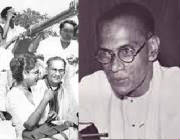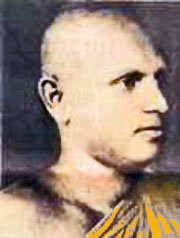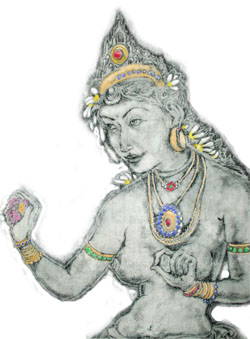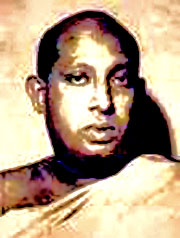|
|
The Devil Dancers: History Comes Alive |
||||||
|
A Tangled Web: the abbot, the widow, the assassin and the
Prime Minister
Among the book's historical characters, three have particular
significance, namely: Prime Minister Bandaranaike; Buddharakkita Thera, abbot of Kelaniya; and Cabinet Minister Vimala Wijewardene. However, the latter two - particularly Buddharakkita - have practically disappeared
from the pages of history although they played an important part in the period covered by this book. It is probably no co-incidence
that both were arrested in connection with the assassination of Mr Bandaranaike, although charges against Mrs Wijewardene
were subsequently dropped.
It is by chance that
I stumbled across the character of Mapitigama Buddharakkita Thera; his name having been mentioned - almost as an aside - in
a textbook. I started digging and unearthed some fascinating facts about this extraordinary man whose influence on politics
was equivalent to that of a medieval king-maker. Information about Buddharakkita's political involvement, his greed for
power and need for money emerged largely from court proceedings in which he was involved, including his appeal against the
death sentence for the murder of his erstwhile protégé, Mr Bandaranaike.
Talduwe Somarama Thera was a Buddhist monk and an ayurvedic physician. He acquired his post at the Hospital for Indigenous Medicine some time after
Mr Bandaranaike's election, possibly due to the direct intervention of Buddharakkita who is recorded as having "interested
himself in the appointment".
At the end of 1958, Somarama Thera's appointment came up for renewal. This was, no doubt, the bait used by Buddharakkita to recruit him as an assassin. But was this a sufficient inducement to commit murder? There is little to give an insight into Somarama Thera's personality except what he told the Magistrate in a statement (later retracted) following the assassination of Mr Bandaranaike. However this, together with other evidence, indicates a man whose political and religious convictions bordered on zealotry. Like many others with similar beliefs, Somarama expected great things from the new Prime Minister. Like them, he was disappointed. He was obviously sympathetic to Buddharakkita's argument that "there is no future for the Sinhalese or the language if things go on like this." The only solution to this problem, according to the abbot, was the assassination of Prime Minister Bandaranaike. Interestingly, Somarama presented no moral objection to this proposal, only a practical one. Who would look after his temple and pupils? Having had his qualms dismissed by the abbot, Somarama Thera meekly agreed to perform the task in the belief that the interests of "my country and my religion and race" justified the murder of "a man who had done me no wrong". Somarama was given some cursory training for the task by his fellow conspirators. Having been presented with an enormous revolver which he described as being "about a foot long", the short-sighted monk was driven into the countryside and told to practice. His target? Kaduru fruit growing on roadside trees. On the day of the assassination,
the monk took a medicine "to make myself brave". This may have been an ayurvedic potion but a comment in the Court
proceedings indicates that it may have been something else. At some stage in his life, it appears that Somarama had been an
opium addict.
Widow Wijewardene: the abbot's consort?
Rumour, propaganda and surmise have obscured the true nature
of Vimala Wijewardene's relationship to Buddharakkita Thera. However, a number of facts can be stated with certainty.
At sixteen, Vimala married into a wealthy, influential family whose members were devout Buddhists and supporters of a Sinhalese nation. The generosity of her mother-in-law, Helena, had restored the ancient monastery of Kelaniya and ensured its continuing prosperity. Her husband, Don Charles, was a polemicist who wrote a tract entitled ‘Revolt in the Temple' which supported the active role played by monks in affairs of state. It was also Don Charles who introduced a 19-year old monk, Buddharakkita Thera, into the Wijewardene household. |
|
|||||
|
On two occasions, Buddharakkita sponsored Vimala's attempts to become a Member of Parliament (although he also financed other candidates). On the second occasion, she was successful and, soon after Mr Bandaranaike came to power, she was also appointed to a position in his Cabinet: no doubt, in recognition of Buddharakkita's considerable contribution to the Prime Minister's electoral success. Trial records show that the abbot was not only a frequent visitor to Vimala's house but that, on certain occasions, he stayed overnight. However, it is questionable whether or not this was indicative of an affair. The Appeal Court neatly side-stepped this issue by referring merely to the abbot's "unorthodox behaviour ... at the house of Mrs Vimala Wijewardene." Indeed, when anonymous pamphlets made scurrilous accusations concerning the nature of Vimala's relationship to the abbot, she is reported to have been extremely upset. Having asked the Prime Minister to remedy the situation, she was infuriated by his reluctance to act. What is beyond dispute is her close political alliance with Buddharakkita
Thera and her growing antipathy to Mr Bandaranaike. This alone was sufficient to impugn her after the Prime Minister's
assassination. Although the charges against her were subsequently dropped, Mrs Wijewardene was, initially, one of seven suspects
accused of complicity in the plot to kill Mr Bandaranaike
|
||||||



